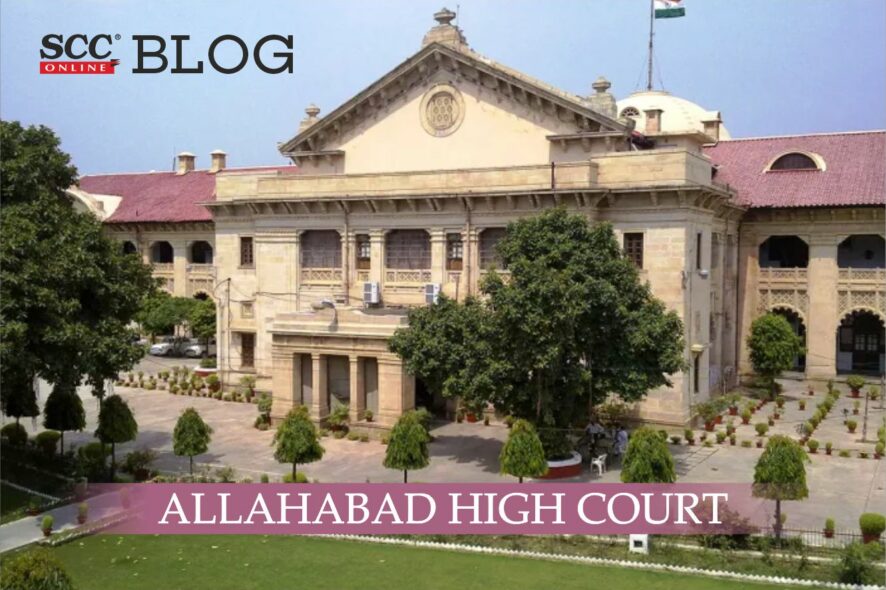Allahabad High Court: The Division Bench of Kaushal Jayendra Thaker and Ajai Tyagi, JJ. while deciding an appeal which was filed challenging the judgment and order of convicting accused-appellant under Sections 326 of Penal Code, 1860 (‘IPC') and Section 3 (2) (v) of Scheduled Castes and the Scheduled Tribes (Prevention of Atrocities) Act, 1989 (‘SC/ST Act') observed that to prosecute a person for an offence committed under Section 3(2)(v) of the SC/ST Act, there must be evidence to show that the accused committed the crime knowing that such person/victim is a member of a Scheduled Caste or a Scheduled Tribe.
The FIR came to be lodged against the accused on 29-01-2011 by the father of the injured as the injured was hospitalized.
Counsel for the appellant had submitted that Section 326 of IPC is not made out as injuries are not such which would fall within the purview of Section 326 of IPC. As far as commission of offence under Section 3 (2) (v) of SC/ST Act was concerned, it was submitted that the F.I.R. nowhere states that the injured belonged to a particular community. No documentary evidence to prove the same was there.
The Court considering this a special case discussed the importance of FIR and its content. The Court noted that this FIR was silent on the aspect that the injured belong to a particular community falling in the term ‘Scheduled Castes’ or ‘Scheduled Tribes’ so as to attract the provision of Section 3 (2) (v) of SC/ST Act.
For attracting the provisions of Section 3 (2) (v) of SC/ST Act, there should be corroboration by way of documentary evidence to prove that the injured, on whom the act is committed, belongs to ‘Scheduled Castes’ or ‘Scheduled Tribes’.
The Court relied on the judgment of the Supreme Court in Ram Das v. State of U.P., (2007) 2 SCC 170 where there was rape on woman belonging to Scheduled Caste, it was held that these could be no ground to convict the accused under Section 3 (2) (v) when there was no evidence to support the charge under Section 3 (2) (v) of SC/ST Act. Mere fact that victim happened to be a girl belonging to Scheduled Caste did not attract provisions of SC/ST Act.
The Court observed that in the case at hand no independent witness have been examined who would depose that the accused committed the offence on the ground that injured belonged to a community covered under SC/ST Act. The Court thus believed that this omission proves fatal for the prosecution in such a vital matter where punishment is for life imprisonment.
Judge has not even discussed the evidence and only on the basis of caste, he held that the offence was deemed to be committed. There is no deeming provision under SC/ST Act. The Court consequently set aside the Conviction and sentence under Section 3 (2) (v) of the accused-appellant.
Coming to Section 326 of IPC which deals with voluntary causing grievous hurts by dangerous weapons or means the Court noted that the fact that the injured had sustained burn injuries on the face, show that the injures had sustained grievous injuries therefore, ingredients of Section 326 of IPC are made out.
The Counsel for the petitioner had submitted that the punishment was too harsh in relation to which the Court analysed the theory of punishment prevalent in India. The Court relying on Mohd. Giasuddin v. State of A.P., (1977) 3 SCC 287; Deo Narain Mandal v. State of UP, (2004) 7 SCC 257; Ravada Sasikala v. State of A.P., (2017) 4 SCC 546 held that keeping in view criminal jurisprudence in our country which is reformative and corrective and not retributive no accused person is incapable of being reformed and therefore, all measures should be applied to give them an opportunity of reformation in order to bring them in the social stream.
The Court keeping in mind the facts and circumstances of the case stated that it is necessary to impose punishment keeping in view the ‘doctrine of proportionality’. The Court believed that punishment of 10 years imprisonment is too harsh and the fine of Rs.25000/- is also too harsh reducing it to 9 years’ incarceration and fine to Rs.2000/-, reason being, the complainant and the injured would have been adequately compensated by the Government as they have invoked provisions of Section 3 (2) (v) of SC/ST Act.
[Pintu Gupta v. State of U.P., Criminal Appeal No. – 4083 of 2017, decided on 28-07-2022]
Advocates who appeared in this case :
Dharmendra Kumar Singh, Rajesh Yadav, Advocates, Counsel for the Appellant;
Nagendra Srivastava, A.G.A. assisted by Akhilesh Kumar Tripathi, Advocate, Counsel for the State.
*Suchita Shukla, Editorial Assistant has reported this brief.






